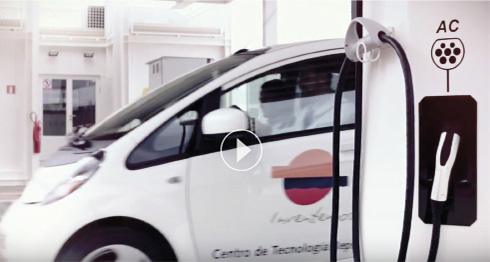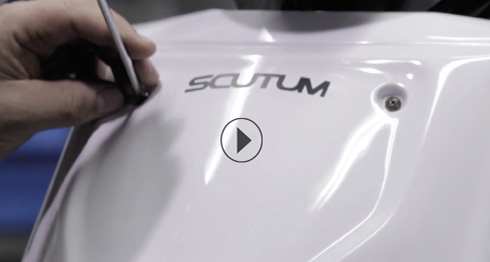




Scooters, leading the way
in electric mobility
The future for electric vehicles in the short term seems to be in small scooters for cities. Repsol has a stake in Scutum, a Spanish company that markets a scooter for fleets and will soon launch a revolutionary removable battery to solve private owner's charging headaches.
“As the leading company in Spain in vehicle power supply, we should be working on projects in every mode of transportation,” explains Carlos Bermúdez García, Repsol’s Electric Mobility Manager.
As part of this strategy, the company has also partnered with IBIL, an electric vehicle charging company that uses 100% renewable energy and already has more than 700 public and private charging stations around Spain.
Market for the electric scooter
Through its emerging businesses division, responsible for creating opportunities beyond the company's traditional businesses, Repsol has joined La Caixa and the Spanish Center for Industrial Technological Development (CTDI) in investing in Scutum, an electric scooter company that started up in 2011 in Esplugues de Llobregat, Barcelona.
The range, size, and performance of today's electric scooters fit with city mobility needs. According to Bermúdez: “All the studies show that this market is going to experience major growth in coming years.”
He goes on to say that the investment in Scutum “is aligned with our objective of getting to know this business [electric vehicles] first hand.” Last year, Scutum won the Eneragen Award for Technologies to Improve Energy Efficiency in the Transport Sector as well as the Entrepreneurship XXI Award for Best Company in the Growth Stage.
Of the 200 million motorcycles on the road around the world, 2% are already electric. Their demand is growing, driven by large delivery and local administration fleets that value the lack of emissions and elimination of noise, but above all value their low energy use; €0.60 for every 62 miles.
In 2015, nearly 600 electric scooters were sold in Spain, 0.4% of the motorcycles sold. Scutum's CEO, Carlos Sotelo, states: “It's still a small market but the potential of the under-125cc electric scooter, which accounts for 80% of the scooters sold in Europe, is quite high.” This size scooter is usually used in cities and according to Sotelo can largely be replaced by electric vehicles.

Research into the electrification
|
|
The Transportation Electrification Lab was created in 2011 with the goal of designing ultraquick charging systems for electric vehicles. These systems could cut charging time to under 15 minutes without affecting battery life. The Lab's researchers are also working with the Technological Institute of Industrial Mathematics (ITMATI) to create simulation models to improve charging using advanced mathematics. |
Other avenues open to research include the inclusion of graphene in energy storage systems as part of the pan-European Graphene Flagship, or the use of new electrochemicals in the batteries. Repsol has a stake in Graphenea, an international leader in the graphene industry. |
Sustainable delivery fleets
Scutum aims to grow from the approximately 500 units that it will sell this year to 20,000 by 2020. With that goal in mind, it is marketing the S02 scooter, designed for fleets and sporting an electric engine that has several settings to adapt to the rider's needs. With the biggest battery, 6 kWh, the scooter tops out at 50 mph, has a 62-mile range, and can fully charge in six hours using a domestic plug.
Up to now, most of Scutum's customers have been courier or delivery companies with set hours and routes, and with scooters that are stored and charged in closed facilities. Correos, the Spanish postal service, which aims to progressively make its fleet more electric, just acquired 100 of the S02 scooters, and several cities' municipal services, such as Barcelona de Serveis Municipals (B:SM), are also investing in emissions-free scooters.
Challenges: charging and pricing
Although prices are falling and manufacturers are offering more all the time, the challenges facing the electric scooter are still charging and prices. In the scooter market, the range problem has been solved as the batteries can already handle the city trips of under 16 miles a day that more than half of all scooter drivers make.
Some electric models are almost double the price of equivalent petroleum-powered scooters. To cover this gap, the Ministry of Industry, Energy, and Tourism has launched plan MOVEA, offering 300,000 euros in funding to put 1,500 to 2,500 euros towards the purchase of electric motorcycles.
These scooters save on fuel costs, however; 99 euros if they do 5,000 kilometers a year according to the calculator on Scutum's website. According to Sotelo: "They hardly have any maintenance costs as almost everything is electronics. When we put an electric scooter on the road for private owners, we even include maintenance for the first four years straight in the sales price."
Scutum has patented a removable battery that can be wheeled around to charge at home or at the office
A portable battery to make charging easier
Mass use of the electric scooter among private owners will be what makes the real difference. "There's still that fear that you're going to end up with no battery because you can't recharge it in an instant like when you fill a tank with gas," states Sotelo. To address that fear, Scutum is preparing its S01 model, an electric scooter with a removable battery that users can recharge at home or at the office.
Scutum has patented a system at European level which gives the battery wheels so it can be moved around, and also works as an anti-theft device. It has a 44-mile range and can go from 0 to 30 mph in under five seconds. The model is slated for sale by 2017.
The battery makes up to 45% of the price of the Scutum model with the most range. To compete with petroleum-powered scooters, Sotelo states: "We believe that the battery has to be independent of the scooter and be charged monthly on a lease." This systems opens up the option of service stations offering battery changes.
Introduction to SCUTUM

 | |
| Download all the images in this News | |
 ZIP. 3,2 Mb ZIP. 3,2 Mb | |
 | |
| Download the complete articles in this News | |
 PDF. 2,8 Mb PDF. 2,8 Mb | |
IBIL and Scutum, Repsol electric mobility
IBIL is continuing to expand its charging infrastructure, and recently installed the first three public stations for motorcycles in the center of Madrid. The two electric mobility companies Repsol has a stake in have signed a technical and commercial collaboration agreement that includes charging as well as the electric motorcycle that the Repsol Honda GP Team uses in its paddock.
Electric vehicles are no exception to the wave of connected vehicles, and will be connected to our handheld devices to show their GPS position and battery level. Scutum is putting the finishing touches on its first connected scooter, another evolution in scooters that are "computers with wheels and whose look will change quite a bit in the next few years,” concludes Sotelo.
Dirección de Comunicación |
Campus Repsol · C/ Méndez álvaro, 44 |